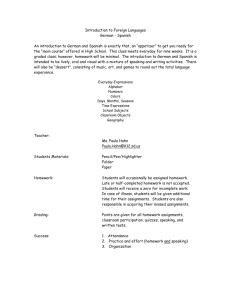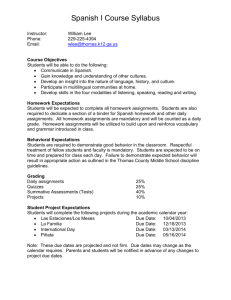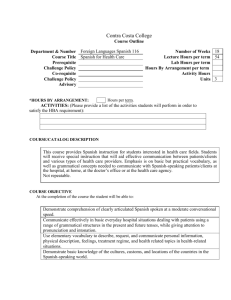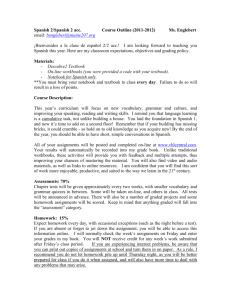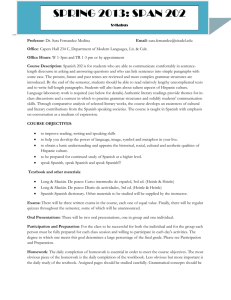HU_3292 - Humanities Digital Media Zone (HDMZ)
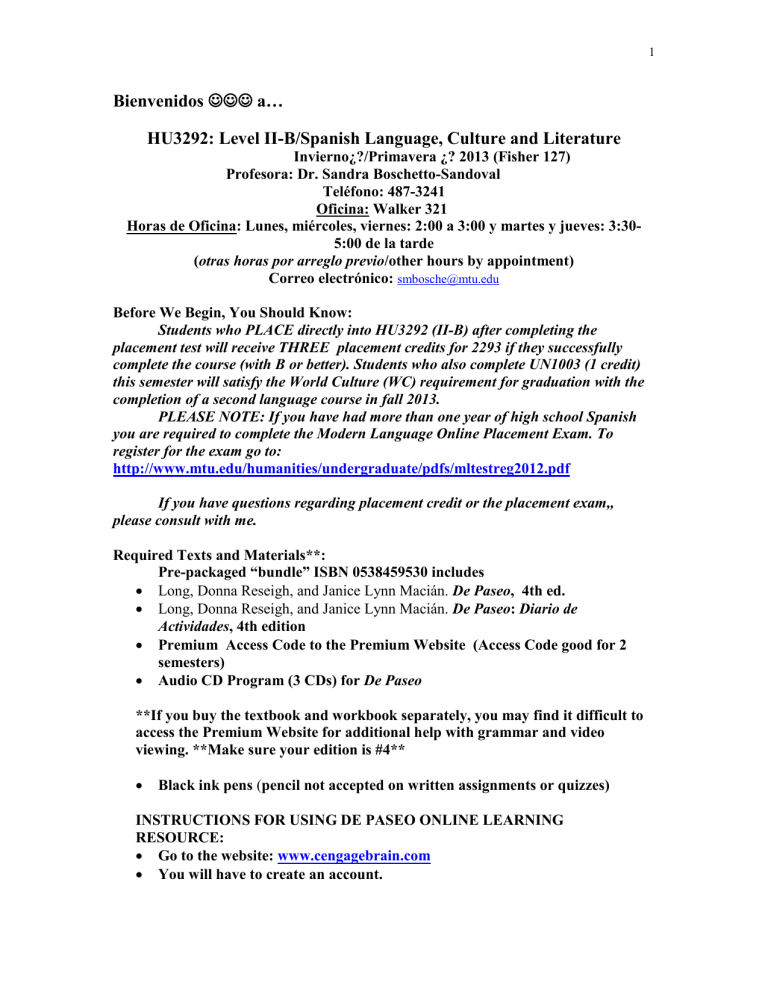
Bienvenidos
a…
HU3292: Level II-B/Spanish Language, Culture and Literature
Invierno¿?/Primavera ¿? 2013 (Fisher 127)
Profesora: Dr. Sandra Boschetto-Sandoval
Teléfono: 487-3241
Oficina: Walker 321
Horas de Oficina: Lunes, miércoles, viernes: 2:00 a 3:00 y martes y jueves: 3:30-
5:00 de la tarde
(otras horas por arreglo previo/other hours by appointment)
Correo electrónico: smbosche@mtu.edu
Before We Begin, You Should Know:
Students who PLACE directly into HU3292 (II-B) after completing the placement test will receive THREE placement credits for 2293 if they successfully complete the course (with B or better). Students who also complete UN1003 (1 credit) this semester will satisfy the World Culture (WC) requirement for graduation with the completion of a second language course in fall 2013.
PLEASE NOTE: If you have had more than one year of high school Spanish you are required to complete the Modern Language Online Placement Exam. To register for the exam go to: http://www.mtu.edu/humanities/undergraduate/pdfs/mltestreg2012.pdf
If you have questions regarding placement credit or the placement exam,, please consult with me.
Required Texts and Materials**:
Pre-packaged “bundle” ISBN 0538459530 includes
Long, Donna Reseigh, and Janice Lynn Macián.
De Paseo, 4th ed.
Long, Donna Reseigh, and Janice Lynn Macián.
De Paseo: Diario de
Actividades, 4th edition
Premium Access Code to the Premium Website (Access Code good for 2 semesters)
Audio CD Program (3 CDs) for De Paseo
**If you buy the textbook and workbook separately, you may find it difficult to access the Premium Website for additional help with grammar and video viewing. **Make sure your edition is #4**
Black ink pens ( pencil not accepted on written assignments or quizzes)
INSTRUCTIONS FOR USING DE PASEO ONLINE LEARNING
RESOURCE:
Go to the website: www.cengagebrain.com
You will have to create an account.
1
2
After your account is created, go to “Register your Access Code or Alpha
Code.
Enter the book’s ISBN number. The Student copy ISBN for De Paseo is on the back listed as: 978-1-4282-6292-8
This will give you access to resources related to this textbook.
If you have any problems, use the tech support access of the website for additional help or visit the HDMZ Language Lab (Walker 113) for assistance with DVDs and CD-Roms.
**PLEASE NOTE: Access to video and audio support is guaranteed only to those who purchase ht text and workbook with access code through the book store.
Recommended but not required:
A good bilingual dictionary!
By “good” I mean one that includes: modern word usage, entries that give parts of speech, gender of nouns, and idiomatic expressions, extensive equivalents for words and phrases, verb charts and other grammatical information, list of abbreviations, and a pronunciation guide. If your current dictionary does not include the above, it will be useless for this class. If you cannot buy your own Spanish-English dictionary right now, the Language
Lab (Humanities Digital Media Center in Walker) and the reference section of the
Library have several on hand for you to use.
Course Objectives
De Paseo helps learners develop the skills they will need for advanced study in grammar, composition, and literature . The course textbook is designed to focus on key language structures with guided approaches to writing and reading. HU3292 continues the general Spanish grammar review begun in HU3291, with continued focus on functional vocabulary reinforcement and usage in and outside the classroom, and the refinement and expansion of strategies for acquiring intermediate level listening, reading, and writing acquisition. The course focuses on development of all five skills: listening comprehension, oral communication, reading, writing, and cultural and intercultural understanding. The resources for accomplishing these goals include the basic textbook, the workbook, access to the De Paseo premium website (for interactive grammar, audio and video practice), and additional materials available in the
Modern Language Lab (Humanities Digital Media Center, Walker first floor, 113).
By the end of HU3292 you should have improved your skills in order to:
Feel comfortable in a Spanish-speaking social or limited working environment
Participate in discussions in Spanish with intermediate level comprehension and fluency
Read Spanish at an intermediate level of complexity, including authentic texts
(literary, essayistic, technical)
Present your view on subjects of interest to you individually and to the class as a group.
3
Write Spanish texts with intermediate fluency, including topic compositions and intermediate length descriptive narratives
Be more familiar with and accepting of cultural difference
Learn more about yourself and others as interconnected intercultural speakers**
**HU3292 incorporates more extensive readings of varied cultural and literary texts, followed by written analysis. The reason for this is to help you prepare to undertake more complex reading and writing assignments in HU3293, HU3294 and/or HU3295.
** Another important goal of the course is to skill you in the practice of becoming an intercultural speaker . By engaging with the many variants of the Spanish language, and the lives of the people who live them and use them, you become part of a network of relations—through interaction and exchange of your experiences of life, your imagination, your ideas, the things you can do, your likes and dislikes. Being intercultural is not about being safe in your knowledges and ways of doing things; it is about border crossing, risk-taking, taking time to listen/to read others, and to reflect on new learning and new perspectives generated from the “encounters with difference.”.
This is one way to describe critical intercultural understanding.
¿Qué tiene que hacer Ud.?
Language learning is a challenging and rewarding experience! The keys to success are curiosity, open-mindedness, humor, a willingness to take risks, and above all, continuous practice. Be prepared to set aside at least 9 hours per week for study outside of class.
Additionally, you are expected to:
Attend regularly and participate actively in class.
Familiarize yourself with the COURSE DESCRIPTION and CLASS
ASSIGNMENT SCHEDULE (PLAN de Clase). You will be held accountable for all policies, procedures, and restrictions thereto.
Familiarize yourself with the ancillary materials (i.e. Premium Website) attached to the De Paseo textbook and workbook, and take advantage of the interactive exercises and materials. Access important information at the website: http://www.cengage.com/logoin .
Follow up on all files/documents/assignments posted on CANVAS or to our listserv: hu3292-sp13-l@mtu.edu
Come prepared to class . Outside preparation is absolutely crucial to your active participation and success in this class.
Bring required textbook and workbook ( Diario de actividades ) to class every day!
Keep up with all oral and/or written (TE) assignments listed on the PLAN de
CLASE (separate handout provided/posted every two-three weeks . Be prepared, however, for variable fluctuations in assignment scheduling, as the
PLAN de CLASE is also always tentative.
Utilize the Premium Website (packaged as a bundle with your text) for additional practice with listening, vocabulary, and grammatical points. If you complete exercises or quizzes online, you can forward them to me via email, and earn additional preparation/participation points.
4
Clarify any “issues” with the instructor before week two (2!)
Do not cram assignments in the last weeks of class, as you will not receive credit for these if you do.
REVISE all assignments, quizzes, compositions, and tests in a timely manner
[outside of class, never in class please!] This not only earns you EXTRA
CREDIT ; it better prepares you for the next quiz or test. (Unrevised work is opportunity lost!)
Double space all written assignments.
Use only
14 pt. font
on all typed assignments; you may use ink, but make sure it is BLACK and BOLD . Penciled assignments or those written in red, blue, or green ink will not be accepted.
Be prepared to work in small groups, to role-play, and to give presentations in class (all in Spanish).
TURN OFF all cellular phones before entering class.
If cell phones ring in class, minus points equivalent to ONE UNEXCUSED ABSENCE will be deducted from the participation portion of your grade. A second offense entitles you to a “D” in the participation portion of your grade (25%). Please inform family members or significant others that you are in class and unavailable by cell phone.
NO LAP TOPS are allowed in class without prior (first week) written permission from the Dean of Students Office.
If you need extra help with assignments Email ( smbosche@mtu.edu
) or visit me in my office (Walker 321), or visit one of the consultants in the HDMZ Lab or review grammatical points at StudySpanish.com
. My office hrs. are posted above. I can arrange other meeting times, as well.
Be respectful and supportive of each other while learning to laugh at your own verbal bloopers! Fluency in a language takes YEARS of hard work and patience.
Ask for clarification whenever you feel lost. Please take responsibility for your learning and that of your peers as well!
Follow proper behavior and classroom etiquette as per MTU student handbook
[i.e. No food or drink allowed in class, please, unless you have medical authorization from the Dean of Students Office]
¡Premio y recompensa! (Your reward!
)
The payoff for all the work you will do in this class is one of the most exhilarating and important that can happen. The study of language is not only about learning how our neighbors speak and act in their cultural surroundings. We also gain important insight into our own language and cultural way of being. Through language and culture study we learn to live in a diverse community complexly woven of similarities, differences, and connections.
On a more mundane level, the 2 nd
year sequence of Spanish courses fulfills a substantial part of the requirements for the Spanish Language and Area Studies
Certificate, the Spanish Minor and/or the Spanish International Minor (approved
January 2002), all of which are great additions to any professional portfolio. More information on the Minor and International follows below.
5
Class Requirements
Your final grade will be based on the following class requirements. PLEASE NOTE : All requirements must be completed to pass the course
I. Attendance, Preparation, and Class Participation: a) Attendance
30%
I do not expect attendance to be a problem in this course, knowing that you are a highly motivated group of students. However, spring session classes present particular problems that make a strict attendance policy necessary. Each day, I will circulate a signup sheet during the first minutes of class. Make sure that you are in class ON TIME to sign the sheet. If you consistently arrive late for class, you will lose attendance/participation credit.
¡IMPORTANTE!
: A simple email note or a verbal communication does NOT qualify as an officially excused absence. What is an officially excused absence?:
One that is authorized in writing by a doctor, another instructor, a coach, a program director, a supervisor, or the Dean of Students. Students who miss
MORE THAN THREE classes without university-approved excuses or who are excessively late for class will suffer serious final grade reductions. There will be no passing grade for students who miss MORE THAN 30% of classes without university-approved excuses.
¡IMPORTANTE !: If you have flu-like symptoms with fever, stay home!! Consult with a physician before returning to class with your note in writing.
¡IMPORTANTE
!
: there are no make-ups for quizzes missed because of unexcused absences. If you know in advance that you will not be able to attend class or complete a quiz, it is your responsibility to make prior arrangements with me and to complete the required assignments in a timely manner. b) Preparation and Participation:
Follow the PLAN de CLASE (or tentative class schedule)
[separate handout] for oral as well as written assignments; it is your responsibility to make sure you complete all assignments and revise when needed. Come to class prepared to PERFORM Spanish in class . Prepare to be involved and engaged during each class session. English, remember, does not earn you participation credits!
Those who volunteer responses in Spanish most frequently are those who most likely will accomplish the higher grade.
A great way to prepare, especially if you are more visually inclined is to complete Review & Practice Exercises online. Complete interactive Crossword or
Concentration vocabulary exercises or Grammar Practice Activities. Flash cards are also available for practice online! Interactive practice quizzes are also available online. These can be saved, printed out, or emailed to me!
Quizzes in class may occasionally “pop” up to check preparation.
6
Remember to volunteer responses in class whenever possible in Spanish . If called upon for a response, do not be afraid to make mistakes. We learn from our mistakes, by reflecting on them, and moving on! Be prepared to demonstrate verbally that you have prepared assigned oral work . Remember, one of the emphases of this class is
SPEAKING. Any attempt to do this in Spanish is considered participation.
Use of
English is not! This applies for small group work as well . ¡OJO! This is a large class; more volunteer participation effort is required from you!
To summarize: In addition to attending class regularly, your final participation grade will be assessed on the following: 1. Use of Spanish in class; 2.
Willingness to volunteer in whole class activities and to participate and cooperate in pair and group work; 3.Level of preparedness.
II.
Oral and Written Assignments:
Tareas orales (oral preparation homework) and
25% tareas por escrito
(written homework) are assigned to insure that you receive feedback on your progress towards speaking, reading, and writing proficiency. Several writing assignments are closely linked to reading tasks. Several assignments may be *bundled* together with listening comprehension, reading, and writing tasks. This means you may be using the textbook, the workbook, and the Premium Website access code (for audio and video work) at the same time! You may also be assigned specific handouts (HOJAS) to prepare.
Most assigned work is to be prepared for oral work in class . Written assignments are designated as
TE
( tareas escritas ) and are to be handed in for a grade. These are appropriately labeled in your PLAN de CLASE.
** NOTA: All TE (tarea escrita) assignments are to be completed individually outside of class.
Some TE assignments will be composition-length (150—300 words).
NOTE: These longer composition assignments may be tallied with tests/exams (see below).
TE assignments may be revised for additional credit!
Revision is an essential component of all writing assignments in this class. REVISION is both voluntary and/or required!
You are urged to revise if you receive anything lower than an A on TE assignments!
Follow proper procedure for revising these assignments (see below). I will use various qualifiers to inform you as to whether the assignment exceeds, meets or falls short of expectations. If your paper is not qualified in some way ( bien , muy bien , excelente, vale (OK), or by a grade), your work may not be acceptable. If you see N.R on your paper, the assignment has not been recorded
(N.R) and must therefore be revised (NR=Needs revision!)
**
PROCEDIMIENTO PARA REVISAR: MUY IMPORTANTE : All assignments should be double spaced; this is especially true of TE
assignments. They should be written out in large lettering in bold black ink or typed. If typed, please use 14pt font. All written assignments and completed revisions should be clearly labeled (Chapter?) referenced
(Assignment #) and dated. Revisions should be written on a separate sheet of paper, clipped or stapled on top of the original copy.
Corrections are never to be made on the original (assignment, quiz, or exam) unless told to do so.
If these procedures are not followed, I will know that you have not read this Course Description; you will lose participation credit for each assignment that is not delivered in proper format.
PLEASE NOTE: that the PLAN de Clase is always tentative; if we are late in getting to a particular assigned activity, you will have time to revisit, re-read, and yes, re-write those assignments that may be due at a later date. Use the extra time to review and re-read!!
This allows for more oral engagement in class! There should be no excuse for falling
behind. You will NOT receive credit if assignments are crammed in the final weeks.
NOTE: DO NOT ask me “if (you) have any missing assignments.” It is your responsibility to keep on target with assignments—marking assignments turned in and returned/graded, being attentive in class, or following up on our list-serv communication by email.
III. TESTS/EXAMS
There are no mid-term or final exams in this class!
25%
Short chapter tests may take as little as 25-30 minutes to complete. Longer exams may also be given as takehome work. TEST dates are noted on the tentative PLAN de CLASE. ALL EXAMS
ARE REVISABLE , following the procedure noted above. No make ups for exams are allowed for unexcused absences, unless pre-arranged with me.
7
8
III.
PAIRED ORAL CLASS PRESENTATION 20%
You will soon be provided with a list of TEMAS (topic themes) for oral presentation. These will be based on some of the videos that you will watch/listen to outside of class, as well as on other topics. You will work in pairs to select one of these TEMAS for presentation to the class. In preparation for the presentation, separate instructions (handout) will be provided to you, along with the list of
TEMAS. The TEMAS will focus on historical, cultural, literary, and/or environmental topics relevant to or connected with our readings in DE PASEO. You will be informed soon as to presentation dates.
EXTRA CREDIT:
5% additional credit will be assigned to the participation portion of your grade if you attend at least 6 Peñas during spring semester. Be sure to sign in for each Peña attendance! The first Peña is scheduled for JUEVES, el 24 de enero de 5:00 a 6:00 de la tarde en el HDMZ [Humanities Digital Media Zone] (Walker).
5% additional credit will be assigned to the participation and exam portion of your grade if you successfully engage in intercultural conversation with a native speaker of Spanish (at least 10 posted cross-cultural emails) through Language Exchange: http://www.mylanguageexchange.com/
Be sure to keep copies of those exchanges! You will need to attach them to your
(two) 2-page summary report of your experience in Spanish.
Academic integrity: Students who cheat, plagiarize, or fabricate information on any assignment, as well as students who help others cheat, plagiarize, or fabricate can receive sanctions ranging from warning to special failing grade to expulsion from the University, depending on the severity of the offense.
See the MTU Student Handbook or the Academic Integrity Policy: www.admin.mtu.edu/usenate/propose/02/18-02.htm
GRADES:
Grades will be assigned according to the following scale:
93-100
92-89
88-82
81-77
A
AB
B
BC
70-76
65-69
60-64
<60
C
CD
D
F
Final Grades are finally calculated on a 7 pt. scale ( A=7 – F=0)
Language Lab
The Language Lab is part of the Humanities Digital Media Zone (or HDMZ) located on the first floor of the Walker Bldg (Walker 113): (to the left and down the hall as you enter the building through the front door). There are various procedures that need to be followed when using equipment or material in the lab. The lab is an important component of language learning. FOLLOW POSTED SIGNS CAREFULLY FOR
9
ACCESS TO THE LAB . While I will NOT REQUIRE attendance, the lab serves as an important resource for aural/ listening comprehension practice.
In addition, several assignments from the Diario de Actividades manual will require those of you who do not have internet access at home to make full use of the lab on a regular basis. Lab hours are usually posted outside the door of the HDMZ .
Monitors and “consultants” will be available to help you. I will update you as the semester progresses. Please note: You are automatically charged a lab fee upon registration for a language class! Put this money to good use by taking full advantage of the equipment and varied materials, including special dictionaries, audio tapes, videos, vocabulary and grammar exercises available there and purchased with your money!
¿SABIA UD. QUE….? [Did you know that…?]
There are now as many Spanish speakers in the world as English speakers! Spanish is spoken on four major continents. ¿Sabes cuales?
In 2003 the U.S. Census Bureau delcared Latinos to be the largest minority group in the U.S. surpassing African-
Americans and reaching 40 million, which constitutes more than 10 percent of the whole
Spanish-speaking world. By the end of the 21 st
century, their cultural, poltiical, and economic influence will be enormous. Every time we celebrate our Spanish heritage we remember the important role that Spanish language, culture, and history have played and continue to play in almost every facet of U.S. culture, including language. Spanish is the unofficial second language of the United States. Some would have us believe that
Spanish is no longer to be viewed as a “foreign” language in the U.S.
.
As Ilan
Stavans asks: “Is a form of communication so intimately related to the fabric of our nation’s life, spoken by millions, really alien to our collective identity?” (
The Chronicle
Review , July 2005, B6).
Find out more about Spanish language and culture, as well as other languages of the world by visitng http://www2.ignatius.edu/faculty/turner/languages.htm
en la red
(online)
HU3292 and the World Cultures Requirement
If you took the language placement exam, and placed into this class, and pass this course with B or higher, you will receive three (3) placement credits: for 2293 . If you also complete UN1003 (1 credit) this semester and go on to complete HU3293 IN
FALL 2013 you will also satisfy the World Cultures requirment for graduation. If you have already completed 2293 or 3291, you will not receive any additional placement
credits, until you successfully complete higher-level courses (HU3294 or HU3295).
Students may continue with third and fourth-year level language courses in Spanish and count these courses toward the general education distribution requirement (at least nine credits) and also earn credits toward a Minor or International Minor in spanish
Minors and International Minors in Spanish Language and Culture!
10
Competing successfully in the world market requires language skills, cultural awareness and international experience. The study of a modern language will help students address that challenge. In addition to gaining proficiency in the language and intercultural communication skills, students will also study literature and acquire knowledge of contemporary issues. A minor in a modern language can give students the competitive edge in their career and help them develop skills to cope effectively with the complex challenges of a rapidly changing global environment.
Students who want to earn a MINOR in Spanish (18 credits) must complete nine
(9) credits of the language (not including 2291 or 2292), and three courses (9 credits) chosen from Spanish-language specific courses at the 3000 or 4000 level (see your instructor for the list which can be taken either at MTU or completed through study abroad Three of the nine credits may be earned through participation in an approved internship in a country of the target language.
Students who want to earn an INTERNATIONAL MINOR in Spanish (21 credits) must complete nine (9) credits of language (not including 2291 or 2292) and four courses (12 credits) chosen from 3000-4000- level courses, which can be taken either at
MTU or completed through study abroad. In addition, students must spend at least six
(6) weeks for work or study in a Spanish-speaking country.
Certificate in Spanish and Area Study (21 credits):
In order to encourage students to become internationally informed, the
Department of Humanities and Social Sciences, in cooperation with the School of
Business and Engineering Adminstration, will award a certificate in Spanish Language and Area Study to students who complete the program requirements. Certificates are awarded immediately upon completion of all certificate requirements. The difference between the International Minor and the Certificate is that the Certificate does not mandate either study abroad or advanced study in Spanish language and culture.
Instead students may satisfy requirements for the Certificate by completing requirements in English.
For additional information on Certificates, Minors and International Minors, please see your instructor or view our website at: http://www.hu.mtu.edu/mod_lang/
MTU Study Abroad (Mexico, Latin America, or Spain):
If you are interested in obtaining information on study abroad, internship, or coop opportunities [with or without financial aid], please consult with one of the Spanish instructors (Department of Humanities) or with the Office/Director of International
Programs (Administration Bldg.). Most of these programs allow for the transfer of credits to MTU. I am happy to support your application for study abroad if you maintain at least a B average in this class!! Also, please note that a 2.75 overall GPA at MTU is mandated for study abroad. If you are working toward an international minor in
Spanish, either study or an internship in a Spanish-speaking country is also required.
MORE IMPORTANT NOTES:
11
If you face circumstances that could affect your performance in this class, please see me ASAP so that we can make appropriate re-arrangements.
MTU complies with all federal and state laws and regulations regarding discrimination, including the Americans with Disability Act of 1990 (ADA). If you have a disability and need reasonable accommodation for equal access to education or services at MTU, please contact the Dean of Students Office at 487-
2212. For all other concerns about discrimination, you may contact your advisor, department chair, or the Affirmative Action Office at 487-3310.
Your instructor is visually impaired, and has filed under ADA
(American Disabilities Act). Please follow guidelines for written assignments carefully. You may be asked to revise or rewrite an assignment if not perceived as legible or clear by your instructor.
Also, if you raise your hand in class, please do so assertively, as visibly as possible. Please speak to me if you have trouble getting my attention in class.
The syllabus and course schedule may be revised during the semester to accommodate the needs either of students or the instructor.
